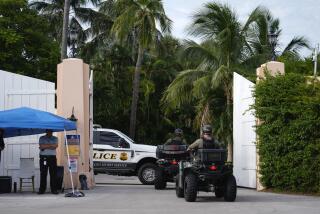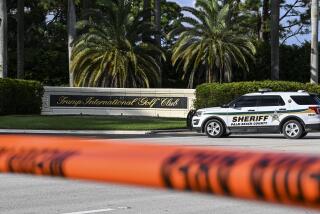Democrats say Donald Trump Jr.’s meeting takes Russia inquiry to a ‘new level’
During what would normally be a time of summer doldrums in Washington, President Trump — following a pomp-filled visit to Paris and a weekend getaway to his New Jersey golf property — returns to a capital roiled by the burgeoning Russia investigation, a faltering GOP healthcare plan and sinking opinion polls.
Trump goes back to work after a four-day absence and another news cycle dominated by disclosures stemming from last summer’s meeting of his eldest son, a Kremlin-linked lawyer and at least one other controversial Russian figure.
Included in that maelstrom were more tweets Sunday by the president renewing his defense of Donald Trump Jr. in connection to that June 2016 meeting in Trump Tower. In a series of tweets, Trump returned to familiar twin themes of attacking former opponent Hillary Clinton and castigating the news media over its coverage of Russia-related matters.
While Trump continued his protestations, senior Democrats said Sunday they believe ongoing disclosures about the meeting could prove to be a turning point in the tangled, months-long investigation of Russian interference in the 2016 presidential election.
“Only smoke and no fire? That’s clearly been put to rest,” Sen. Mark R. Warner (D-Va.), the ranking member of the Senate Intelligence Committee, said on NBC’s “Meet the Press.” “This clearly brings the investigation to a new level.”
The White House dispatched a senior member of the president’s personal legal defense team to the major Sunday news shows to play down last week’s steady drip of revelations about the meeting with lawyer Natalia Veselnitskaya, which was also attended by Trump’s son-in-law, Jared Kushner, now a senior White House aide.
The turmoil coincides with two new public opinion polls showing Trump’s approval ratings are plumbing depths greater than at this point in any modern presidency. Trump, who this week will mark six months in office, characterized the numbers as “not bad at this time,” even while dismissing their accuracy.
And Republican leadership in the Senate delayed a vote on the Obamacare overhaul plan until Sen. John McCain (R-Ariz.) recovers from surgery to remove a blood clot. With two Republican senators already opposed to the bill, GOP leaders need every remaining vote in their caucus to advance the measure.
In the latest chapter of the Russia investigation, defenders and critics of the president offered starkly differing narratives about campaign contacts with still-unknown numbers of potentially Kremlin-associated figures and what that indicated about alleged collusion.
Those clashing interpretations continued a pattern of recent months, but this time the two sides were both referring to publicly available source material: emails disclosed by the president’s son, not characterizations provided by anonymous sources.
Warner, speaking on CBS’ “Face the Nation,” promised to widen the inquiry, bringing in “some of the folks from the Trump digital campaign” to look into the barrage of falsified news stories that appeared on social media users’ news feeds.
Trump for months has described investigations of alleged collusion between his campaign and the Kremlin as a “Dem hoax” and a “witch hunt.”
After an initial White House-sanctioned statement suggesting the meeting was mainly about Russian orphans, the younger Trump acknowledged in emails released last week that the intermediary who set up the meeting described Veselnitskaya as having access to Russian government information that could be used against Clinton. He replied: “I love it.”
In addition to Trump Jr. and Kushner, the meeting was attended by Paul Manafort, who at the time was the Trump campaign chairman, and Rinat Akhmetshin, a Russian American self-described lobbyist with a reported background in Russian counterintelligence.
Warner’s House counterpart, Rep. Adam B. Schiff (D-Burbank), said the meeting and the circumstances leading up to it directly established for the first time the willingness by Trump’s campaign to cooperate with what the U.S. intelligence community has concluded was a broad Russian effort to tip the election in his favor.
“They can call it a fishing expedition. They can call it a witch hunt. It’s all an aligned message with the White House,” Schiff said on ABC’s “This Week.” Even so, he said, “real evidence is coming forward that just can’t be ignored.… This is about as clear of evidence you could find of intent by the campaign to collude with the Russians.”
The fact that the most striking revelations came in the words of the president’s son made it more difficult for the White House to push back against anonymous sources. Even so, Trump again blamed negative coverage for keeping what he has termed a baseless controversy alive.
“Fake News is DISTORTING DEMOCRACY in our country!” he said in an early-morning tweet from his club in Bedminster, N.J. In another Twitter statement, he said Clinton could “illegally get the questions to the Debate and delete 33,000 emails but my son Don is being scorned by the Fake News Media?”
The tweet referred to a primary debate question that had been provided to the Clinton campaign and not to her then-rival, Sen. Bernie Sanders, and to emails Clinton deleted from the private server she used while serving as secretary of State. The disclosure about the debate question was drawn from Russian-hacked electronic communications.
A senior member of the president’s legal team, Jay Sekulow, tried to distance the president from the affair and insisted that the 2016 meeting did not violate any criminal laws.
“I know this: He, the president, was not aware about this meeting, did not participate in this meeting,” he said on CBS’ “Face the Nation.” On CNN’s “State of the Union,” he suggested that the encounter had seemed harmless at the time.
“You’re trying to put a moral, ethical aspect to it,” he complained to interviewer Jake Tapper. “And it’s easy to do that in 20/20 hindsight, but not when you’re in the middle of a campaign.”
And on “Fox News Sunday,” Sekulow said he saw no reason to doubt the president’s statement that he had learned of the meeting only days ago. Democrats have questioned how the meeting could have been kept from the president for so long, particularly as he repeatedly denied anyone from his campaign had strategized with Russians.
“I do not think the denial by the president of the United States is suspect at all,” Sekulow said.
The new polling released Sunday confirmed how deep the hole is that Trump finds himself in six months into his presidency, but also offered some warnings to his Democratic opponents.
A Washington Post-ABC News survey found that 58% of Americans disapproved of Trump’s performance in office and that 36% approved of his performance.
That’s a significantly worse grade than the public has given any president at this point in his tenure since modern polling began in the 1940s.
There’s no evidence that the 2016 Trump Jr. meeting has affected the president’s standing so far, although the poll did find that 63% of Americans thought it was “inappropriate” and that 26% said it was appropriate.
The poll showed a slide in Trump’s standing since the survey was last taken in April. Many other polls in the intervening weeks have documented that drop.
Most of the decline appears to have taken place in early May — around the time that Trump fired FBI Director James B. Comey and the House passed its Republican healthcare bill, which is extremely unpopular.
But the poll offers some potential good news for the president: He has largely kept support within his own party.
While Democrats and independents disapproved of Trump’s performance by large margins, those who identified themselves as Republicans continued to approve, 82% to 15%.
That could give Trump a base on which to rebuild.
The president also could benefit from the Democrats’ failure so far to convince the public that they stand for something other than opposition to Trump. In the Post-ABC poll, 37% said the Democrats stood for something, and 52% said they just opposed Trump.
Separately, a new NBC/Wall St. Journal survey that looked at counties Trump carried in 2016 found that 50% of adults in those areas now approved of Trump. That level is significantly below Trump’s showing in those counties in the election, which averaged about 60%. The two numbers are not entirely comparable, but the figure suggests some weakening of Trump’s backing in the places crucial to his victory.
The Washington Post-ABC poll was conducted July 10 to 13 among 1,001 adults nationwide. The margin of sampling error is 3.5 percentage points in either direction. The NBC/Wall Street Journal survey was conducted July 8 to 12 among 600 adults in the targeted counties. The margin of error for the full sample is 4 points in either direction.
Staff writer David Lauter contributed to this report.
More to Read
Get the L.A. Times Politics newsletter
Deeply reported insights into legislation, politics and policy from Sacramento, Washington and beyond. In your inbox three times per week.
You may occasionally receive promotional content from the Los Angeles Times.










